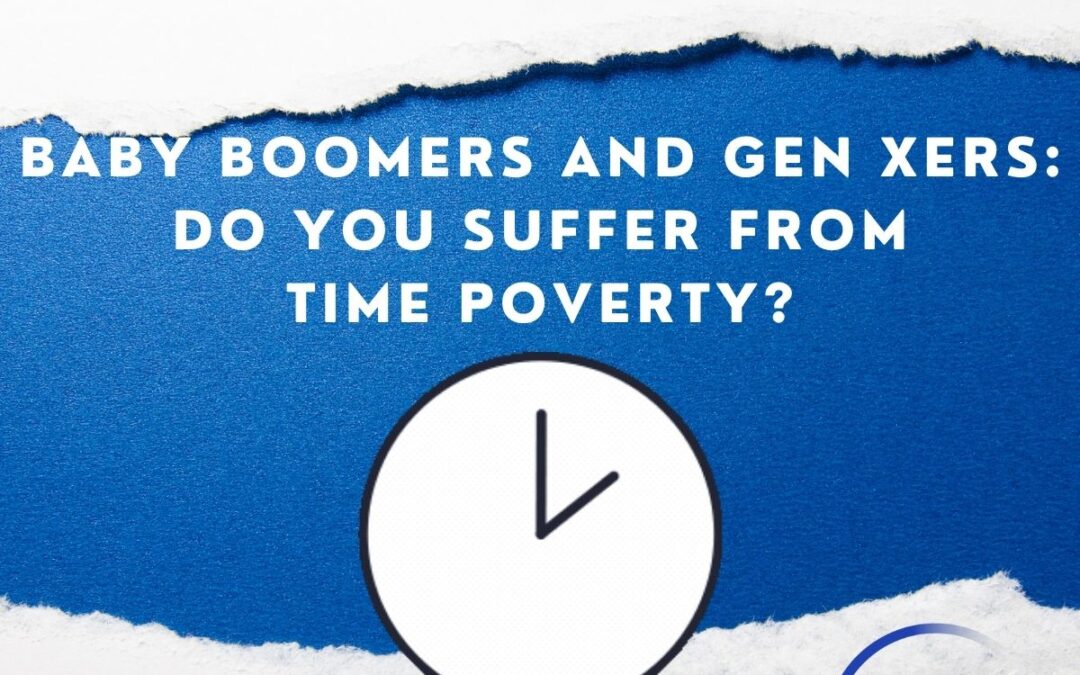It’s that time again…and I just read something that really has me thinking. Even if you don’t fit into the generation above, keep reading, I think you’ll still learn something from this edition.
Long commutes stuck in traffic. Crisis deadlines for your customers. Endless meetings and emails that you can’t seem to get ahead of. Every. Single. Minute. of your day accounted for. Caregiving responsibilities, whether it be for aging parents, as a single parent, or as a grandparent. Sound familiar? If so, you might be experiencing time poverty.
Forbes[1] recently delved into this newer concept, defining it as the feeling of not having enough time to fulfill responsibilities, engage in self-care activities, or pursue personal interests and hobbies. It’s a struggle that many of us can relate to, juggling multiple roles and commitments while trying to find a semblance of balance in our lives.
Understanding Time Poverty
Time poverty is not just being busy; it’s about feeling overwhelmed and constantly rushing from one task to another, constantly feeling pressured to do more! It’s about sacrificing personal well-being and meaningful experiences for the sake of, let’s face it, work productivity and efficiency. We have come to believe that this is our new way of being and that other people are able to handle this pace of ‘doing it all,’ so we continue to normalize it to keep up with others. In a society that glorifies busyness, it’s easy to fall into the trap of prioritizing work over everything else, even neglecting our physical and mental health in the process.
The Fallacy of Time vs. Money
In the quest for success, titles, or retirement (!), we often choose financial gains over time. We are often tasked with prioritizing multiple obligations, and often choose the wrong ones to focus on. We convince ourselves that we will make time one day to do things we want to do: we’ll exercise tomorrow, we’ll get our blood work done next month, we’ll catch that recital next year. We are under the mistaken belief that we can get this time back! But understand this: money is a renewable resource- we spend it, we can always make more. But our time is a valuable non-renewable resource that once spent, we can’t get it back. Read those last two sentences again. This is the mindset perpetuates the cycle of time poverty, sacrificing this precious asset in pursuit of wealth and material possessions, while stressing out and feeling out of control in the process.
Breaking Free from the Time Poverty Trap
Breaking free from being time poor requires a huge shift in our mindset and priorities. We need to start recognizing the value of time as a limited and irreplaceable resource and start making conscious choices to prioritize what truly matters. As we get older, this seems like common sense for most, however, we all have heard the tragic story of someone working hard all their lives only to retire and die shortly afterwards. We must learn to set boundaries, learn to say no to non-essential commitments, and carve out time for family, friends, self-care, and some leisure activities.
Embracing Mindfulness and Presence
Practicing mindfulness and presence can help us reclaim control over our time and attention. By being fully present in the moment and savoring the simple joys of life, we can gain a greater sense of fulfillment and contentment. By taking the time to reflect on what is truly important to us, whether it’s enjoying a leisurely meal with our loved ones (no more rushing through mealtime), taking a walk in nature (no more checking emails until 2 hours have slipped away), or pursuing a creative hobby (no more working on weekends), these moments of presence remind us of what truly matters in life: a more time vs. more money-making balanced life.
Investing in Self-Care and Well-Being
Self-care is not a luxury; it’s a necessity for maintaining overall health and well-being. Prioritizing self-care activities such as exercise, a massage, meditation, or even sleep, can help replenish our energy reserves and combat the effects of time poverty. When is the last time you woke up rested and not dreading your day? It’s important to remember that taking care of ourselves is not selfish; it’s an essential component of leading a balanced and fulfilling life. Studies show that when we are healthy, both physically and mentally, we are able to perform and function at a higher level, without spending more time on our efforts.
Time is a scarce commodity, so it’s important to reevaluate our relationship with it. Don’t wait to make conscious choices that prioritize well-being and happiness. Recognize the value of time by embracing mindfulness and presence, and investing in self-care, so that we can break free from the cycle of time poverty and create a life that is rich in meaning and fulfillment. This is the one time that you should have FOMO (fear of missing out)! After all, in the words of William Penn, “Time is what we want most, but what we use worst.” It’s time to reclaim time and live life before our time runs out.
Did you have an ‘aha’ moment? Is this something you have being thinking more about? What are you doing to use your time more wisely? I’d love to hear from you. Drop into my DMs on social media (see below) and let me know.
Interested in joining the Empowered Path Private FaceBook Group? Click here.
TimeManagement hashtagLifeHacks hashtagWorkLifeDecisions hashtagPriorities
[1] https://www.forbes.com/sites/traversmark/2024/03/05/a-psychologist-explains-the-concept-of-time-poverty-and-offers-4-fixes/

